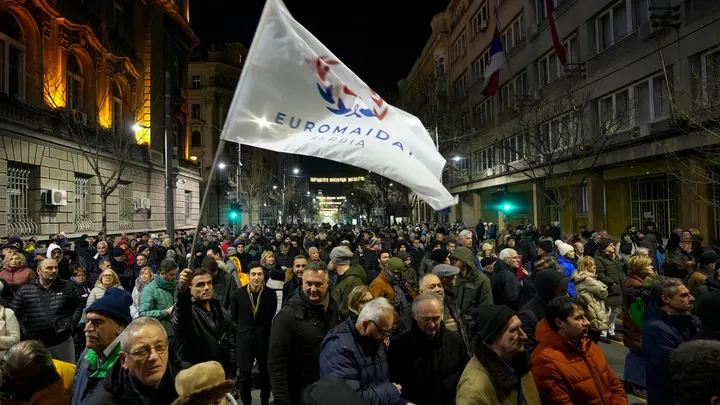In recent developments in Serbia, streets have become arenas of dissent as citizens express their disapproval of President Aleksandar Vučić’s government. Accusations of election fraud have fueled these protests following the contentious parliamentary and local elections held last month. Opposition supporters, galvanized by claims of unjust electoral practices, have taken a firm stand, demanding a revote under fair conditions.
The core of the controversy lies in the results declared after the December 17 elections, which saw Vučić’s Serbian Progressive Party emerge victorious. The primary opposition coalition, Serbia Against Violence, has vehemently contested these results, asserting that the elections were marred by fraudulent activities, especially in the Belgrade city vote. Marinika Tepic, a leading opposition politician, articulated the sentiment of many when she said, “The entire planet knows that the thief has been caught stealing. There are no free and fair elections here. If we give up this fight, there will be no more elections.”
Despite these claims, Serbian election authorities and the courts have dismissed the opposition’s grievances. However, these rejections have yet to do much to quell the public outcry. International observers have echoed concerns about the electoral process, highlighting severe irregularities such as ballot box stuffing and vote-buying. Additionally, local election monitors have raised alarms over the alleged busing of voters from various regions, including neighbouring countries, to sway the vote in Belgrade.
The response from President Vučić and his party has been one of denial, labelling these reports as “fabricated.” This stance, however, did not prevent the escalation of tensions in December, when police deployed pepper spray against protesters attempting to enter the Belgrade City Hall, leading to several arrests.
In a poignant display of discontent, protesters on Tuesday also commemorated the assassination of Oliver Ivanović, a moderate ethnic Serb politician from Kosovo, who was killed on January 16, 2018. This act underscored the ongoing tensions in the region, particularly regarding Kosovo, a former Serbian province that declared independence in 2008 – a status Belgrade does not recognize.
The political turmoil in Serbia occurs against its aspirations for European Union membership. Serbia has resisted imposing sanctions on Russia, a critical ally supporting its stance on Kosovo, further complicating its international position.
Serbia finds itself at a crossroads, grappling with internal political strife and its implications for the country’s future. The widespread protests against the alleged election fraud signify a deep-seated distrust in the electoral process and the current government. As the country navigates these turbulent times, its citizens’ resolve and its leaders’ response will be crucial in shaping Serbia’s path forward.







